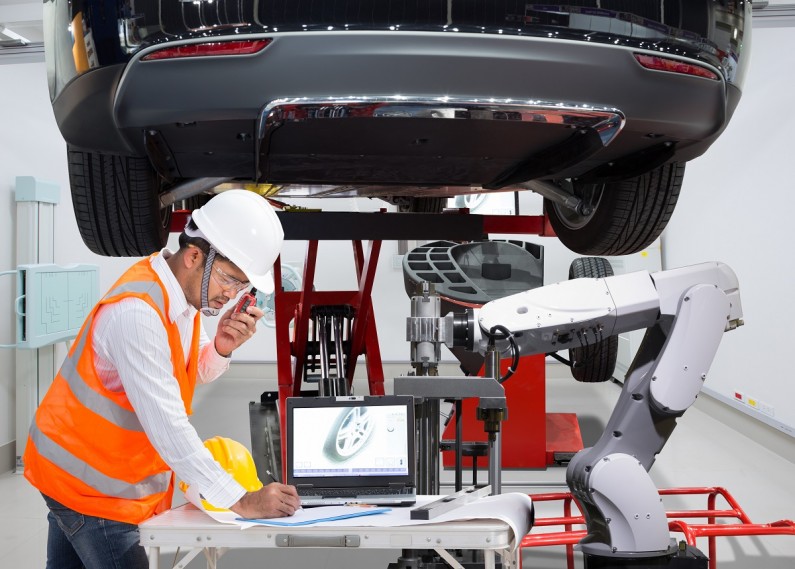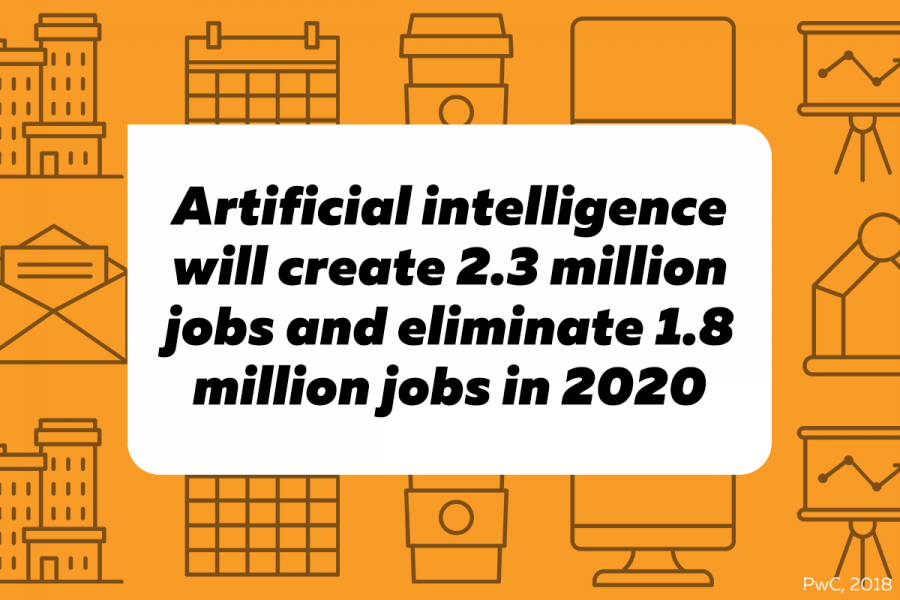Get ready to work in a digitally transformed world

Our future of work series explores how technology will transform your career. First up – artificial intelligence is changing the world of work, but you can thrive if you have the right skills.
What's on this page?
The digital revolution will change the way we work
We’re seeing big changes happening in the world of work, but this isn’t new. People’s working lives have been disrupted throughout history by technological revolutions such as farming and industrialisation.
However, the digital revolution happening today is transforming our world much faster than we’ve ever seen before. Increased processing power, big data, sensors, and smart devices will have a growing impact on our working lives. Robots and advanced computing technology are automating jobs and tasks previously reserved for humans. Whole jobs are disappearing and almost every job will be reshaped.
But there’s no need to panic. Artificial intelligence (AI) will mean the number of people working alongside robots will be greater than the number of people whose jobs are replaced by robots. When a robot picks up more mundane and routine tasks, it leaves us free to work on more interesting jobs and tasks that can’t be automated. Technology can take over some jobs, but remember that it can also complement others.
Some sources even predict AI will create more jobs than it eliminates. We’re likely to see jobs emerge such as:
- medical robot designer – designing robots used in medical science (for example, to help surgeons perform complex operations)
- energy grid modernisation manager – managing the upgrade of the power grid so it wastes less energy
- privacy protection engineer – decreasing privacy risks in information systems.
Jobs in demand will need your technological and creative skills
In a global marketplace where many employers are on the lookout for ways to keep their competitive edge, it’ll be the people who can take their CV to the next level with a combination of technical and creative skills who’ll be most in demand.
Many of the jobs in highest demand will be concentrated in technology-related sectors, so your future prospects are likely to be excellent if you have one or more of the STEM skills of science, technology, engineering and maths.
But if you have a combination of STEAMED skills – science, technology, engineering, art, maths, entrepreneurship and design – you’ll be snapped up! People who can come up with new ideas, products, and cures to solve the world’s most pressing problems will be most sought after in the future world of work.
Being prepared is key to success
You can take action to prepare for a career that’s changing or doesn’t exist yet by:
- keeping up with the big trends, like technological change and new ways of working
- focusing on building up your skills by taking short courses
- practising creative thinking
- learning to work with others to solve problems.
Developing these qualities will:
- increase your resilience
- help you become more adaptable to change
- make AI something you’ll embrace rather than fear.
There’s also an expectation that the way you’ll work in future will change. It’s likely to be a more dynamic environment where it will be normal to move in and out of many jobs, and even spend some time out of work. This will require a new mindset, including being financially prepared to manage gaps in your employment.
Get more future of work articles
Our future of work article series explores the latest career research to show how technology will transform your career.
- Aim for skilled, creative work with a human touch – let AI do the rest
- Future careers are skills-focused
- Employability skills are the heart of the future
- Find a new way of working: entrepreneurship and portfolio careers
Sources
- AI Forum New Zealand, 'Artificial Intelligence: Shaping a Future New Zealand', May 2018, (www.aiforum.org.nz).
- Center for the Future of Work, '21 Jobs of the Future: A Guide to Getting – and Staying – Employed for the Next 10 Years', November 2017, (www.cognizant.com).
- Donovan, E, 'Govt Too Upbeat about AI – Expert', 8 March 2018, (www.radionz.co.nz).
- Foundation for Young Australians, 'The New Work Order – Ensuring Young Australians have Skills and Experience for Jobs of the Future, not the Past', 2015, (www.fya.org.au).
- Gartner, 'Gartner Says by 2020 Artificial Intelligence Will Create More Jobs than it Eliminates', 13 December 2017, (www.gartner.com).
- Kenny, K, 'While Artificial Intelligence is Tipped to be as "Significant as Electricity" it’s not Coming for Your Job, Yet', 2 May 2018, (www.stuff.co.nz).
- Kubiak, L, et al, 'Disruptive Technologies: Risks, Opportunities – Can New Zealand Make the Most of Them?', 21 October 2015, (www.nzier.org.nz).
- Manyika, J, et al, 'Jobs Lost, Jobs Gained: What the Future of Work Will Mean for Jobs, Skills, and Wages', November 2017, (www.mckinsey.com).
- PwC, 'Will Robots Really Steal Our Jobs?', February 2018, (www.pwc.co.nz).
- PwC, 'Workforce of the Future: The Competing Forces Shaping 2030', 2018, (www.pwc.com).
- Robertson, G, Hon, 'Speech to the Productivity Hub on the Future of Work: Adaptability, Resilience and Inclusion', 3 February 2018, (www.beehive.govt.nz).
Updated 16 Dec 2019
